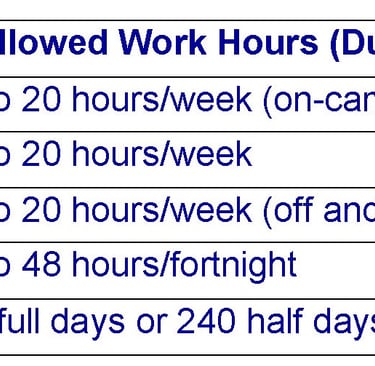✉ shreeconsultancyjsb@gmail.com ✆ Ph. No.: +91 78781-47589 , +91 97828-06464

Tips to Balance Work and Study While Studying Abroad
Discover the best tips to balance work and study while studying abroad. Learn how to manage your time, reduce stress, and excel in both academics and part-time jobs.
Studying abroad is an exciting journey filled with academic, cultural, and personal growth. However, many international students also take up part-time jobs to support their finances. Balancing work and study can be a challenge, especially in a new environment. That’s why effective time management and self-discipline are essential to thrive both academically and financially.
Understand the Legal Work Limits in Your Country
Each country has its own laws regarding how many hours international students can work. Knowing these limits helps you stay compliant and plan accordingly.
Tip: Always check your visa conditions and university policies before accepting a job.
Choose the Right Part-Time Job
Opt for jobs that are flexible, relevant, or located near campus. Ideal roles for international students include:
Library or lab assistant
Tutor or peer mentor
Campus ambassador
Retail cashier
Barista or waiter (off-campus)
Make sure your job doesn’t clash with your academic schedule.
Create a Realistic Weekly Schedule
Time-blocking is key. Allocate specific time slots for classes, study, work, meals, exercise, and sleep. Use weekly planners or tools like:
Google Calendar
Notion
Trello
MyStudyLife
Color-code your schedule to quickly identify academic vs. work tasks.
Prioritize Academic Commitments
Your primary reason for being abroad is to study. Always:
Attend lectures regularly
Keep track of assignment and exam dates
Inform your employer in advance during midterms or finals
Proactive communication helps manage expectations.
Stay Organized with To-Do Lists and Apps
Being organized reduces stress. Use daily or weekly to-do lists to manage tasks.
Recommended Tools:
To-do list – simple to-do manager
Evernote – for study notes and reminders
Microsoft To-Do – sync across devices
Set priorities: mark urgent and important tasks.
Learn to Say No and Set Boundaries
It’s tempting to accept extra shifts or hang out every night. But burnout is real. Learn to:
Say no politely but firmly
Avoid over-committing
Protect your mental health
Balance is not about doing everything, but about choosing what matters.
Make Use of Campus Resources
Universities provide support—use it!
Writing Centers for academic help
Career Services for job advice
Wellness Services for mental and physical health
Student Mentors for real-life tips
These services are usually free and confidential.
Develop Healthy Lifestyle Habits
Don’t sacrifice sleep or meals for work. Healthy students = productive students.
Tips:
Sleep 7–8 hours
Meal prep on weekends
Exercise at least 3 times a week
Stay hydrated (carry a water bottle)
Even 15-minute breaks help recharge your brain.
Communicate with Employers and Professors
Being transparent builds trust.
Let your employer know your academic priorities.
Inform professors if you’re working a lot and need help or extension.
Most people are understanding—especially if you’re honest and proactive.
Use Breaks Wisely
Weekends, holidays, and semester breaks are perfect to:
Catch up on assignments
Take longer shifts at work
Rest and explore your host country
Don’t feel guilty for resting—it’s part of being productive!
Financial Management Tips
Part-time income can help, but don’t depend solely on it.
Budget Smartly:
Track every expense using apps like YNAB or PocketGuard
Avoid high-interest credit cards
Cook at home instead of eating out frequently
Look for student discounts on food, travel, and books.
Real Student Experiences
Anjali (Canada)
“Using Google Calendar changed my life. I color-coded everything—classes in blue, work in green. I never missed a deadline!”
Farhan (Germany)
“I worked 20 hours at a café, but once I reduced to 10 and focused on studying, my grades improved—and I still managed my rent!”
FAQs About Working and Studying Abroad
Q1: Can I work full-time during semester breaks?
Yes, in most countries, international students can work full-time during holidays.
Q2: What happens if I exceed work hour limits?
It can affect your visa status. Always stay within the legal limit.
Q3: Should I prioritize a higher-paying job over a flexible one?
Not always. Flexibility often matters more than pay when balancing studies.
Q4: Can I change jobs if I’m struggling to manage time?
Absolutely. Choose a role that respects your academic commitments.
Q5: Is it okay to not work during the first semester?
Yes, take your time adjusting. Many students start working after settling in.
Q6: What’s the best job for students with irregular schedules?
On-campus roles, freelance gigs, or tutoring often offer flexible hours


